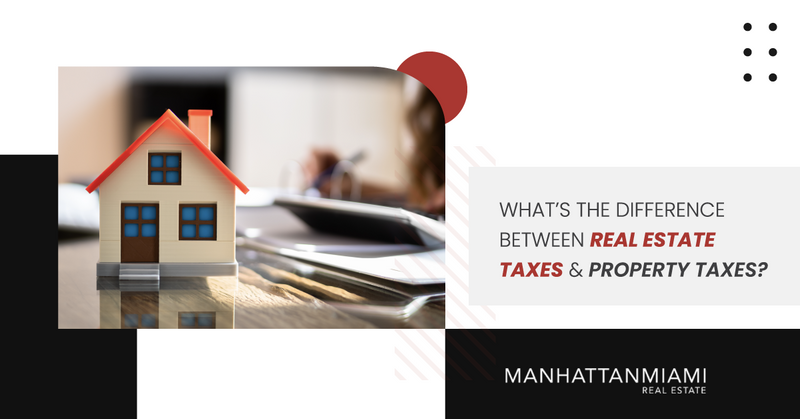
More than likely, you think that real estate tax and property tax are the same things. It's just how most people use the terms interchangeably, which causes some confusion. If you own your own home and a boat, car, or another big-ticket item, you should know the difference. While both types of properties are taxed based on the value of the item, how much you actually pay will depend on whether they're classified as real estate taxes or personal property. If you're still unsure about the differences, that's okay because we'll go into more detail below.
What Are Real Estate Taxes?
When a person owns real estate, they have to pay real estate taxes. To determine how much each homeowner will pay in taxes, you have to multiply a rate that’s been set for the city or municipality by the home’s fair market value. The fair market value of a home can change over time according to the prices that similar homes in the neighborhood have sold for in recent years and any upgrades that have been made to the interior and exterior of the home. If you’ve ever heard of someone not wanting to let an accessor inside of their home because they were afraid that the accessor would value their house higher than what it was currently valued, they’re usually trying to avoid having their real estate taxes go up.
Real estate is defined by the IRS as any kind of land and anything affixed to that land. So if you own hunting grounds or any kind of land, regardless of how you use it and even if there isn't a building on it, that land would be subject to real estate taxes. Additionally, if you own a cabin on that land, it’s subject to real estate taxes and can raise the value of the property as a whole. Additionally, a commercial or industrial building is also subject to real estate taxes. Finally, anything built underneath the property is taxed as real estate. This can include pools, dugout living spaces, fallout bunkers, garages, and almost anything else that you could build underground.
More About How Real Estate Taxes Are Calculated
How a tax rate is determined can depend on where you live. For instance, in New York, the tax rate is determined by taking the rate of at least three different municipalities, counties, towns, or school districts and dividing that by the number of sources that you’re pulling from. This means that the exact tax rate can vary within the same city.
How You Pay for Taxes
When you own a home, you might pay your taxes directly to the IRS, or you might pay your lender, which will pay your tax bill to the IRS on your behalf. If you’ve already fully paid for the home and no longer have a loan, you're more likely to pay your taxes directly to the IRS. Anyone who is in this category of homeowners needs to be especially careful about paying taxes in full and on time to avoid liens on their home and other penalties.
If you have a loan for your home, the taxes are usually tacked onto your monthly loan payment. The lender collects this amount so that they can pay your taxes quarterly to the IRS. If you fail to make the payments to the lender for the real estate taxes, your lender will begin foreclosure proceedings the same way that they would if you were behind on mortgage payments.
What Are Personal Property Taxes?
When you have moveable assets, such as a car, boat, or mobile home, these assets will be subject to property taxes. Like real estate taxes, property taxes are often charged at a particular rate. The total cost of the property taxes that you pay for a moveable asset also depends on the value of the asset in many states. So, for instance, when you have a boat that's valued at $10,000 and a tax rate of 3%, you'll have to pay $300 every year for the personal property taxes on that boat. Having an updated assessment of the value of your personal property can save you money on your taxes because the value of many types of moveable assets tends to go down.
Just like with real estate taxes, if you don’t pay your property taxes in full and on time, you might face fees, liens against the property, and potential seizure of your property.
A Few Exceptions
A general rule of thumb is that if you can move something without it being damaged, it falls into the category of being taxed as property. But if it has to stay in place on land, it’s charged as real estate taxes. A trailer home is classified as personal property if the home is on land that isn't owned by the person who owns the trailer home, such as a trailer home park. In contrast, pre-built homes are considered real property once they're constructed on the property even though they've technically been moved to become part of the property. Most real estate in NYC is unlikely to fall under either of these categories, but there are some neighborhoods where it's possible.
Wrap-Up
Most taxes on a home are taken care of at the sale of the house, but if you’re concerned that you’re not sure of how a particular aspect of the tax system works, you can consult a tax advisor or other professional. It’s also important to remember that falling behind on your real estate taxes isn’t an option, whether you pay your taxes to your lender or pay them yourself at your local tax office. If you end up falling behind, you’ll also subject yourself to the possibility of liens against your real estate and even foreclosure on it.

-2.png?width=500&height=205&name=MIAMI%20HOME%20SEARCH%20(2)-2.png)













